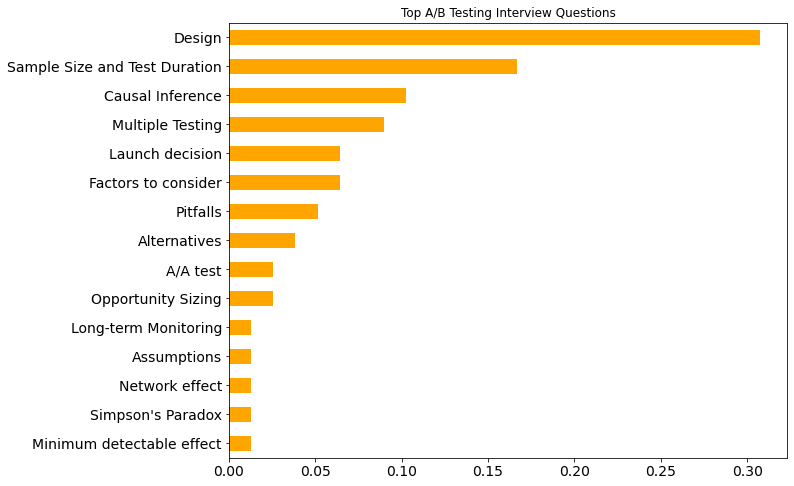How to Ace A/B testing Interview Questions Without Experience
Apr 04, 2023
As you probably already know, A/B testing is one thing that data scientists need to be comfortable with, especially product data scientists. That’s why A/B testing questions commonly appear in the interview process for data science positions.
But how do you ace A/B testing interview questions if you don’t have any real experience with A/B testing?
If you have that concern then you aren’t alone! There are lots of people looking to land data science jobs without real experience in A/B testing, and I want you to know right away that it is possible. You can ace A/B testing interview questions without experience.
To help you learn how to do that, this post will show you what A/B testing questions appear in interviews the most and even offer you a tip for answering the most common A/B testing interview question.
(Before you start reading, remember that you can also head over to my Youtube channel if you would rather learn through a video.)
Understanding the Problem: Confidence and Competency
Before we dive into those top questions though, I want to take the time to understand the challenge a bit better.
Attitude matters a lot in interviews. You want to appear confident and capable, but that can be very hard to do when you find yourself in a position where you have to talk about things you don’t have real-world experience with. You find yourself wondering how you can convince the hiring manager that you have knowledge about something you’ve never done.
This can often make you feel defeated before you even get to the interview, and that, understandably, impacts your confidence, which makes it that much harder to convince the hiring manager that you are the best choice. You need confidence, but how do you get it?
To have real confidence you need real competency, but where do you start? How do you gain knowledge of A/B testing? Should you be watching videos, reading books, or studying online posts? Will you really be able to get enough knowledge this way?
If these concerns sound like you, keep reading because I have good news!
You absolutely can gain real competency and confidence by studying books, watching videos, and even reading posts like this one. If you are eager to get started learning more about A/B testing, I recommend starting with my YouTube playlist on A/B testing. It will help you start building the foundation of knowledge you need for A/B testing.
Besides studying, practice is also key for helping you have confidence and demonstrate competency. Mock interviews are especially useful for this because they give you direct feedback on where and how you can improve.
With all this in mind, let’s now take a look at the top A/B testing questions that appear in interviews. After all, knowing what you are most likely to encounter in interviews is the first step towards overcoming the challenges of confidence and competency.
The Top A/B Testing Interview Questions
One question you may be asking before we even dive into the top interview questions is how we can know which questions are most common. Clearly, knowing what questions are most likely to appear in interviews is beneficial, but how can we be sure which ones those are?
I use a data-driven method to determine which questions most frequently appear in interviews. You can find a detailed explanation of how this system works in my video Data Science Interview 2023 How to Prepare When Time Is Tight.
This method is what I used to land my own jobs and what I teach my clients to help them land their dream jobs. It has proven successful even with people who have no prior experience of A/B testing.
So, if you’re curious about how I determined which questions are the top A/B testing interview questions, be sure to check out that video, but for now, let’s look at how A/B testing interview questions break down.
Breaking Down Categories of A/B Testing Interview Questions
The following diagram shows a distribution of top A/B testing interview questions. This diagram is based on my analysis of 360 interview questions from 46 different companies.

Let’s look at just the top 5 categories to give you an idea of what to expect in interviews.
The Design Question
The design question is a broad question that asks you to design a test to evaluate the effectiveness of a new feature, the success of a new product, etc.
Example Question: How do you design a test to evaluate the effectiveness of a referral program?
As you can see, the top question category (the design question) accounts for over 30% of A/B testing interview questions. That’s huge as it means that the design question accounts for one out of three questions.
Sample Size and Test Duration
This type of question asks you to calculate the sample size and duration of a test. It’s fairly straightforward and accounts for between 15% and 20% of A/B testing interview questions.
Example Questions: How to calculate sample size for an a/b test? What is the relationship between power and sample size? How to determine the duration of a test? Will
Causal Inference
This type of question appears in interviews because causal inference is a method that can be considered when A/B testing is not feasible. It is more common to encounter this type of question when interviewing with companies that use a two-sided or three-sided marketplace business model. Such companies include places like Uber, Lyft, and Doordash.
Example Question: If you can't do an A/B test, what other methods would you use?
Multiple Testing
Multiple testing problems occur frequently in reality. They happen when we run multiple tests in parallel or when we test multiple metrics in one A/B test. Because they happen in reality, it’s very common for an interviewer to ask you questions about how to deal with these problems.
Example Questions: What are Bonferroni and FDR for multiple testing? There are 50 metrics tested, but only 5 are significantly different. What would you do with those metrics to extract insights?
Launch Decision
Launch decision questions ask you to determine whether we should launch a feature or product based on the data gathered from the A/B test.
Example Question: From this test, what is your suggestion to launch this feature or not?
Answering the Design Question
Those are the top 5 types of A/B testing interview questions, but now it takes more time to focus on the top question: the design question.
This is definitely the most important A/B testing interview question. At over 30%, it’s a big chunk of what you will encounter in interviews, so you want to be prepared to answer it well.
These questions typically involve designing a test to evaluate the effectiveness of a new feature or change in a product. The goal is to ensure that the changes beneficial for the users or the business. Here are some more example questions:
- Uber is considering launching a new referral program to get new riders. How do you design a test to evaluate the effectiveness of this program?
- TikTok is thinking about launching this new repost feature that allows users to amplify their videos by sending those videos to their followers. How do you design a test to evaluate the effectiveness of this new feature?
As you can see, these questions can be very broad and open-ended. There’s a lot to talk about potentially because designing a test involves multiple steps such as selecting the right metric, choosing the right randomization unit, calculating the sample size and test duration, determining the minimal detectable effect, etc. How do you handle such a broad question?
Provide a High-Level Summary
My tip is to provide a general summary before diving into the details. You can say something like:
Designing an AB test involves multiple steps such as choosing the right metrics, selecting the right randomization unit, calculating the sample size and test duration, as well as determining the minimum detectible effect. So which component would you like me to dive into?
The idea is to provide a high-level summary that shows you know the different components that are involved in designing a test before discussing the details of each component. What exactly are the benefits of doing this though?
The first benefit is simply that it gives you structure. With such an open-ended question it’s easy for your answers to become disorganized and hard to follow. If you do start trying to talk through every single step, you might leave things out and not show your knowledge to the fullest.
However, by starting with a summary you can be sure that the interviewer will know that you have knowledge on designing an A/B test. It also indicates that you have confidence in being able to discuss any of the steps.
The summary also gives the interviewer more control over your answer. They can choose which component they want to hear more about. They may be more interested in how you would choose the right metric or determine the right randomization unit rather than the other components.
By giving the interviewer options, you make their job easier. They can choose what you talk about which makes it easier for them to get a strong signal about your qualifications. This is especially important when working within the time limits of an interview.
Both of these benefits are why starting with a high-level summary can really make your answer to the design question.
Of course, you still need to be prepared to discuss the individual components that go into designing an A/B test. If you want to review the steps, remember to check out my A/B testing playlist. It covers things like choosing randomization units, metric selection, sample size estimation, and common mistakes in A/B testing. Check it out if you need some refreshers.
Final Thoughts
I hope you found the information in this post helpful. I do want to provide you with one more useful tool before we end.
This A/B testing cheat sheet has helpful information, like commonly asked interview questions and answers, that can help you review right before an interview. If you think that sounds like something you could use, be sure to use the link to grab your copy!
Finally, don’t forget that you can crack A/B testing interview questions without experience. If you know what to expect and put in the work to gain competency and confidence, you can impress interviewers even without real-world experience.
Best of luck with your data science job search!

